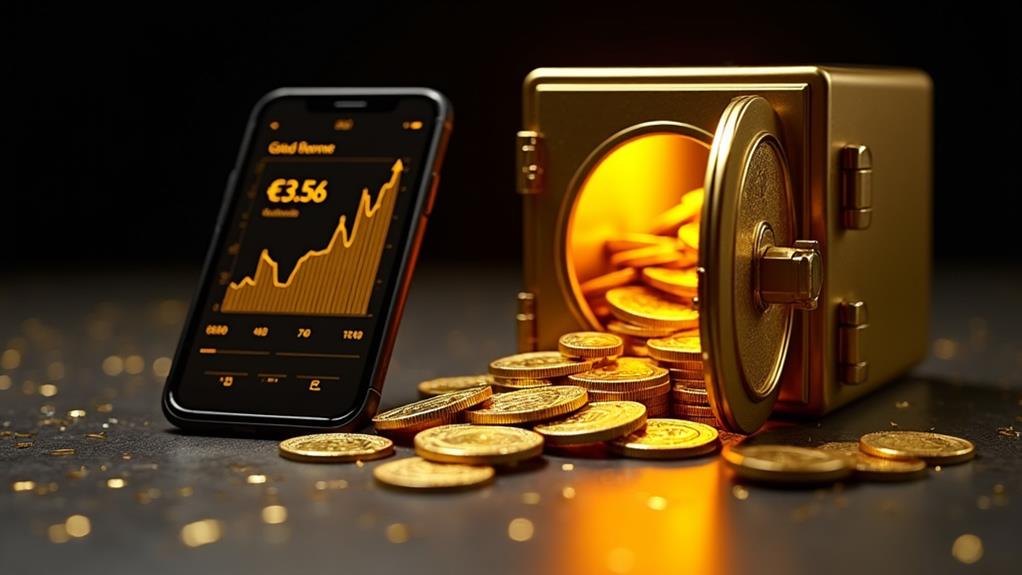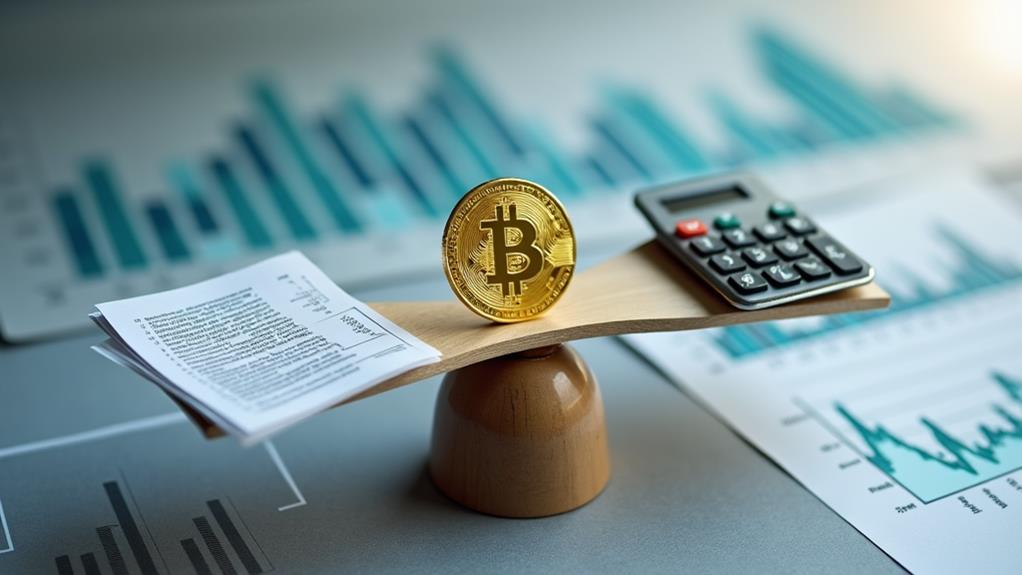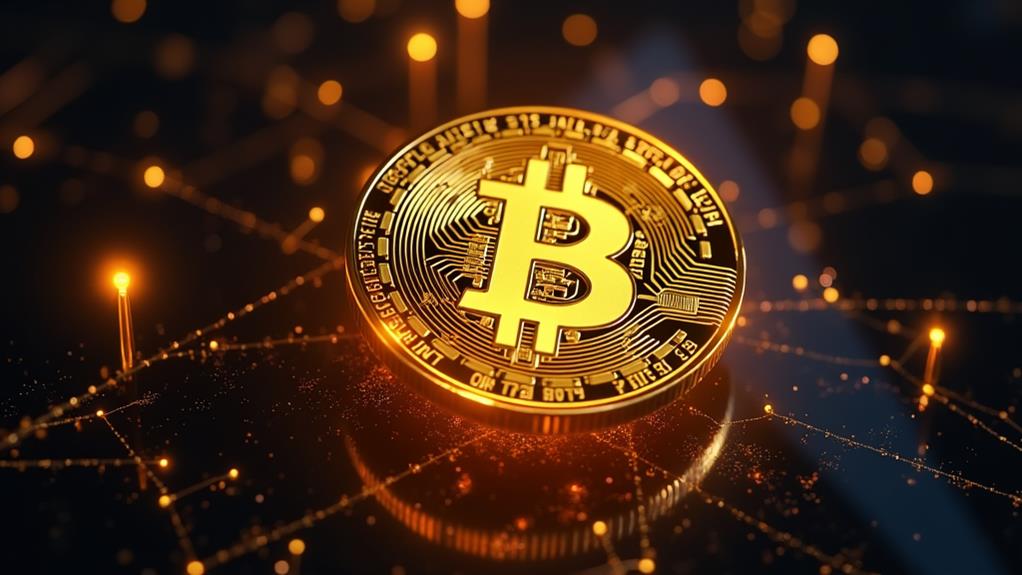Investing in digital gold has emerged as an intriguing alternative to traditional gold ownership, leveraging the advantages of blockchain technology to offer unprecedented accessibility and liquidity. Nevertheless, navigating this relatively new financial landscape requires a thorough understanding of various platforms, from centralized exchanges to decentralized networks, each presenting unique benefits and potential pitfalls. Furthermore, the importance of strong security measures and awareness of regulatory and taxation implications cannot be overstated. As the market evolves, staying informed about these critical factors will be fundamental to making sound investment decisions. Thus, what are the vital elements to consider before exploring digital gold?
Key Insights
- Digital gold investments offer lower entry barriers, 24/7 market access, and secure storage without personal safekeeping concerns.
- Choose between centralized and decentralized platforms, each impacting security, transparency, and user control.
- Ensure platforms have robust security measures, including encryption, multi-factor authentication, and insurance coverage.
- Be aware of cybersecurity risks like hacking and phishing; use two-factor authentication and monitor accounts regularly.
- Understand taxation implications, including short-term and long-term capital gains, and stay updated on regulatory changes.
Definition of Digital Gold

As a concept, digital gold refers to gold-backed cryptocurrencies or tokens that represent ownership of physical gold stored in secure vaults. These digital assets aim to combine the stability of gold with the convenience of blockchain technology.
Understanding how digital gold works is essential for potential investors:
- Backed by physical gold: Each token represents a specific amount of gold.
- Stored securely: The underlying gold is held in audited, insured vaults.
- Traded electronically: Tokens can be bought, sold, or transferred instantly.
Investment benefits of digital gold include:
- Accessibility: Invest in gold without physical storage concerns.
- Divisibility: Purchase fractional amounts of gold easily.
- Liquidity: Trade tokens 24/7 on digital platforms.
According to financial analyst John Smith, "Digital gold offers a modern approach to gold investment, but investors should carefully consider the risks associated with cryptocurrency platforms and regulatory uncertainties."
Types of Digital Gold Platforms
When regarding digital gold platforms, investors must understand the distinction between centralized and decentralized options.
Centralized platforms, often operated by established financial institutions, offer familiar features and security measures but may be subject to regulatory oversight.
Decentralized platforms, built on blockchain technology, provide greater autonomy and potentially improved security through distributed ledger systems, yet they may require more technical knowledge from users.
Centralized Vs. Decentralized Platforms
While exploring digital gold investment options, investors must take into account the fundamental distinction between centralized and decentralized platforms. Centralized digital gold platforms are operated by a single entity, often a company or financial institution, which manages transactions and maintains records.
Decentralized platforms, on the other hand, operate on blockchain technology, distributing control among network participants.
Key differences between centralized and decentralized digital gold platforms:
- Security protocols: Centralized platforms rely on traditional cybersecurity measures, while decentralized platforms use cryptographic techniques.
- Investment transparency: Decentralized platforms offer greater transparency through public ledgers.
- Regulatory compliance: Centralized platforms often adhere to stricter regulatory standards.
- Transaction speed: Centralized platforms typically process transactions faster.
- User control: Decentralized platforms provide users with more control over their assets.
Investors should carefully evaluate these factors when choosing between centralized and decentralized digital gold platforms, taking into account their individual risk tolerance and investment goals.
Features and Security Measures
Digital gold platforms offer a range of features and security measures designed to protect investors' assets and facilitate seamless transactions.
These platforms typically employ strong cybersecurity measures, including encryption protocols and multi-factor authentication, to safeguard user accounts and sensitive information.
Storage options vary, with some platforms offering allocated storage, where specific gold bars are assigned to individual investors, while others use unallocated storage, pooling investors' gold holdings.
Fraud prevention systems, such as third-party audits and insurance coverage, are implemented to ensure the integrity of transactions and protect against potential losses.
Key features often include:
- Real-time pricing updates
- Mobile app accessibility
- Fractional ownership options
- Integration with traditional banking systems
As cybersecurity expert John Smith notes, "Investors should carefully evaluate a platform's security measures and track record before entrusting their assets to any digital gold service."
Benefits of Digital Gold Investing

Flexibility stands at the forefront of digital gold investing benefits. Investors can purchase and sell digital gold with ease, enjoying the convenience of transactions from anywhere with internet access. This modern approach to gold investment offers several advantages:
- Lower entry barriers compared to physical gold
- 24/7 market access for trading
- Secure storage without personal safekeeping concerns
- Potential for fractional ownership
- Easy portfolio diversification
Digital gold combines the stability of traditional gold investments with the accessibility of digital assets. This allows investors to capitalize on gold's historical value while leveraging modern technology.
Nevertheless, it's vital to understand that digital gold, like any investment, carries risks. Investors should carefully research platforms, security measures, and regulatory compliance before committing funds.
While digital gold offers convenience and flexibility, it's important to approach this investment option with caution and due diligence.
Risks and Challenges
While digital gold offers potential benefits, investors must be aware of its fundamental risks and challenges.
The volatility of digital gold prices can lead to significant market fluctuations, potentially resulting in unexpected losses for unprepared investors.
Furthermore, the digital nature of these investments exposes them to cybersecurity threats and fraud attempts, requiring strong security measures and watchful monitoring by both investors and platform providers.
Volatility and Market Fluctuations
Characterized by rapid price swings, the digital gold market presents significant volatility risks for investors. Price volatility in this sector often exceeds that of traditional gold markets, with factors such as technological advancements, regulatory changes, and market sentiment contributing to unpredictable fluctuations.
Investors must be prepared for:
- Sudden price drops or spikes
- Reduced market liquidity during periods of high volatility
- Increased transaction costs due to wider bid-ask spreads
- Potential for extended bear markets
- Heightened risk of market manipulation
The digital gold market's relative immaturity compared to traditional gold markets exacerbates these issues. Although some investors view volatility as an opportunity for profit, it likewise poses substantial risks.
Expert John Smith notes, "Digital gold's price volatility can be both a blessing and a curse. Investors must approach this market with caution and a thorough understanding of its unique dynamics."
Cybersecurity and Fraud Concerns
The digital sphere of gold investment brings with it a host of cybersecurity and fraud risks that investors must steer carefully. Investment risks in this area include hacking attempts, phishing scams, and unauthorized access to digital wallets. Platform reputation plays a significant role in mitigating these risks, as reputable providers invest heavily in cybersecurity measures to protect their clients' assets.
| Risk Factor | Potential Consequence | Mitigation Strategy |
|---|---|---|
| Hacking | Asset theft | Two-factor authentication |
| Phishing | Identity theft | Education on scam tactics |
| Data breach | Financial loss | Regular security audits |
Investors should prioritize platforms with strong security protocols, including encryption, multi-signature wallets, and cold storage options. Regular updates to security software and staying informed about the latest cybersecurity threats are vital practices for safeguarding digital gold investments. Vigilance and due diligence remain critical in navigating this evolving investment landscape.
Getting Started With Digital Gold

Initiating your digital gold investment expedition requires careful consideration and preparation. Understanding gold investment basics and familiarizing yourself with buying and selling procedures are vital first steps.
Before plunging in, research reputable platforms that offer digital gold services and compare their fees, security measures, and track records. To ensure a smooth start, consider the following essential points:
- Verify the platform's regulatory compliance and insurance coverage
- Understand the minimum investment requirements and storage fees
- Familiarize yourself with the process of converting digital gold to physical gold
- Learn about the tax implications of digital gold investments in your jurisdiction
- Develop a strategy for monitoring gold prices and market trends
Once you've completed your due diligence, start with a small investment to gain experience and gradually increase your holdings as you become more comfortable with the digital gold investment process.
Storing and Securing Digital Gold
Security stands at the forefront of digital gold investment concerns. When investing in digital gold, secure storage is essential. Many platforms offer insured vaults to protect your assets, eliminating the need for personal safekeeping. These vaults are often located in secure facilities with advanced security measures.
Storing digital gold:
- Choose reputable platforms with strong security protocols
- Verify insurance coverage for stored assets
- Enable two-factor authentication for account access
- Regularly monitor your account for unusual activity
Dr. Jane Smith, a cybersecurity expert, advises: "Always research the platform's security measures and track record before investing."
It's vital to understand that while digital gold offers convenience, it likewise presents unique security challenges. Investors should remain alert and stay informed about best practices for protecting their digital assets.
Regular security audits and updates to storage methods can help mitigate risks associated with digital gold investments.
Taxation of Digital Gold Investments

While secure storage is a significant aspect of digital gold investments, understanding the tax implications is likewise essential. The taxation of digital gold investments can vary based on the regulatory framework in your jurisdiction. Generally, digital gold is treated as a capital asset, making it subject to capital gains tax.
Key considerations include:
- Short-term capital gains: Taxed at higher rates if held for less than a year.
- Long-term capital gains: Taxed at lower rates if held for over a year.
- Reporting requirements: Investors must report digital gold transactions in their tax returns.
- Deductible expenses: Certain costs, like transaction fees, may be deductible.
- Regulatory changes: Always stay updated on new tax laws affecting digital assets.
Understanding these factors can help traverse the intricacies of taxation in digital gold investments.
Market Trends and Predictions
Market trends and predictions for digital gold investments are becoming increasingly relevant as more investors seek safe havens in volatile economic climates. The price of gold remains a crucial factor influencing the appeal of digital gold. Market trends indicate a steady increase in demand, driven by economic uncertainties and the convenience offered by digital gold providers. Analysts predict that digital gold will continue to gain traction, especially among tech-savvy and younger investors.
| Year | Market Trend |
|---|---|
| 2020 | Rise in digital gold adoption due to pandemic |
| 2021 | Increased volatility, more digital gold investments |
| 2022 | Stable growth in digital gold market |
| 2023 | Potential for higher digital gold prices |
| 2024 | Expansion of digital gold providers |
These trends suggest a promising future for digital gold investments.
Comparing Digital Vs Physical Gold

The comparison of digital and physical gold requires an examination of their respective storage and security requirements.
While physical gold demands secure storage facilities and incurs related costs, digital gold is stored in online platforms, reducing physical storage concerns but introducing cybersecurity risks.
Furthermore, liquidity and accessibility differ between the two, with digital gold allowing for quicker transactions and easier access compared to the more cumbersome process of trading physical gold.
Storage and Security Differences
Navigating the complexities of storing and securing gold, whether digital or physical, requires a subtle understanding of their distinct characteristics.
Physical gold demands secure storage solutions like insured vaults, which involve additional costs and logistic considerations. Digital gold, on the other hand, is stored electronically, often backed by equivalent physical assets stored in secure locations.
Key storage and security differences include:
- Physical Storage Costs: Insured vaults and security systems for physical gold.
- Electronic Security: Digital gold requires strong cybersecurity measures.
- Accessibility: Physical gold needs secure transport; digital gold can be transferred online.
- Risk of Theft: Physical gold is susceptible to theft; digital gold faces cyber threats.
- Insurance: Physical gold in insured vaults vs. digital gold backed by insurance policies.
Liquidity and Accessibility Comparison
Understanding the security and storage nuances of gold sets the stage for evaluating its liquidity and accessibility.
Digital gold offers superior liquidity compared to physical gold; transactions can be completed swiftly on digital platforms, providing instant access to capital.
Physical gold, on the other hand, requires physical handling and storage, which can delay liquidity.
Accessibility likewise varies significantly; digital gold can be managed from anywhere with internet access, enhancing convenience for investors.
Conversely, physical gold requires secure storage, often leading to additional costs and logistics.
Digital platforms streamline these processes, making digital gold more accessible and liquid for modern investors.
Nevertheless, the intangible nature of digital gold may not suit all investment strategies.
Regulatory Environment for Digital Gold
A strong regulatory framework is crucial to fostering trust and stability in the digital gold market.
The regulatory environment for digital gold covers several fundamental aspects to ensure investor protection and market integrity:
- Compliance with financial regulations: Digital gold providers must adhere to local and international financial laws.
- Transparent auditing: Regular audits are conducted to verify the amount of physical gold backing the digital gold.
- Insured vaults: Physical gold is stored in insured vaults, safeguarding against theft and loss.
- Anti-money laundering (AML) protocols: Implemented to prevent illegal activities.
- Consumer protection laws: Ensure that investors' rights are upheld.
These measures collectively contribute to a secure and reliable digital gold investment landscape, enhancing investor confidence.
My Final Thoughts
In summary, investing in digital gold presents a modern avenue for asset diversification, offering benefits such as accessibility and liquidity. Nevertheless, it comes with intrinsic risks, including price volatility and cybersecurity threats. Investors must traverse regulatory landscapes and tax implications carefully. By understanding the types of platforms available and prioritizing strong security measures, one can safeguard their investments. Ultimately, while digital gold holds promise, it is crucial to tread carefully and stay informed.







